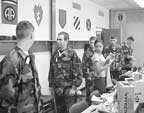Six Army ROTC freshmen transitioned Friday from the physical grind of countless push-ups and sit-ups at 6 a.m. to wide-eyed students in a classroom setting only a few hours later.
These students are the newest members of LSU ROTC, and on Friday they were given a taste of what to expect for the upcoming year during a physical fitness test and at a meeting afterward.
Most students join ROTC to get a college education and to become officers in the U.S. Army.
Three components made up the Army Physical Fitness Test. The first is two minutes of push-ups without breaks, followed by two minutes of sit-ups. The third is a two-mile run that male cadets must complete in 16 minutes and 30 seconds and female cadets must finish in 19 minutes and 42 seconds. Ten-minute rests followed the pushups and sit-ups.
Master Sgt. Joel Padilla, who was in charge of APFT, said although the cadets looked a little beat, it was an accomplishment.
“They had an expression on their face like they accomplished something when it was over,” Padilla said. “I was just giving them words of encouragement, telling them not to quit.”
Alec Moyer, a history freshman, said he was satisfied with his performance.
“When I started the test I was relieved; the anticipation was the worst part,” Moyer said. “At 9:30 my roommates were at the block party at East Laville, and I was waking up often at night. There was a part during the sit-ups and push-ups where I [thought I] couldn’t continue but wouldn’t stop so I just told myself to keep going.”
Recruiting officer Maj. Glenn Nunez said he likes the direction of the ROTC program.
“There are some drastic improvements from when I was here 12 years ago. Leadership training is leaps and bounds past where it was in the ’80s,” Nunez said. “When I was a cadet you were locked into one position all year long. Cadets now are routinely put in leadership positions where they are evaluated. At the end students do their own evaluations, so at the end they can make an improvement.”
John Cross, a computer engineering freshman, said he joined the ROTC for the leadership training. Cross said his uncle, who has a military background, influenced his decision.
“My junior year of high school I had a couple classmates that were looking into it as well, and I did some research on it also,” Cross said.
Nunez said ROTC pays for scholarship students. Tuition and fees are covered for scholarship students, in addition to $300 a semester for books. LSU provides room and board. They receive a monthly stipend beginning at $250 for freshmen that increases by $50 each year. Students who are in the program and receive TOPS keep the extra money.
Ashley Higgins, a biology freshman, said the scholarship she received was a “big, big factor.”
“If I didn’t get the scholarship I probably would have gone to Northwestern,” she said.
Nunez also said there is a large commitment associated with joining ROTC.
“A scholarship cadet comes out with a four-year active duty commitment or eight years in the Army Reserve,” Nunez said. “A non-scholarship student comes out with a three-year active duty commitment or six years in the Reserve.”
The meeting after the APFT started with a video featuring an airborne tank, soldiers preparing for combat and soldiers at an award ceremony with their parents. Cadets were then told about the opportunities and responsibilities of the ROTC, then they took a tour of the firing range and classrooms inside the military science building.
Students interested in ROTC apply for four-year scholarships in their senior year of high school. Fifty students interview for one of eight scholarships. The applicants must pass an Army physical and medical evaluation, then pass the Army fitness test to be accepted.
Jesse Brandon, a biology freshman, said he is happy he is one of the eight students selected, but it would not have affected his decision to join.
“[The scholarship] is like a bonus for me; I like the organization and everything about it. I would have most likely entered it without the scholarship,” Brandon said.
Brandon said he likes the program particularly because it is different from everything else.
“A different type of person goes through this. [Cadets are] people with integrity, people you can trust,” he said.
ROTC freshmen face harsh welcome
August 27, 2003

ROTC freshmen face harsh welcome



